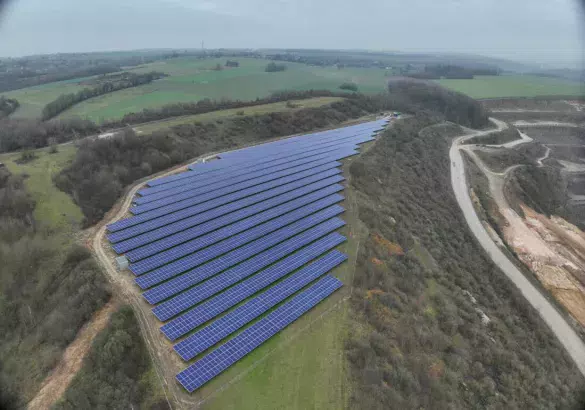GLOBE
This project is part of our commitment to sustainability via the decarbonization of our operations, and will enable us to offer a low-carbon product without compromising on quality. Together with our colleagues, our customers and all our stakeholders, we innovate to reduce our CO2 emissions and help build a more sustainable future.
This project that we intend to develop at our Marche-les-Dames GLOBE, long-term project site in Belgium would represent the first major investment in the construction of an industrial kiln for dolime production designed to operate in Oxyfuel mode.

State-of-the-art technology to significantly reduce CO2 emissions
The latest generation of kilns helps maximise the energy efficiency of dolime manufacturing. By incorporating state of-the-art technology based on targeted use of oxygen for combustion (Oxyfuel), these kilns maintain their efficiency while delivering a flue gas concentrated in CO2, enabling the optimised use of carbon capture, transport and storage technology, also known as Carbon Capture and Storage (CCS).
As part of the GLOBE project, this innovative kiln with a capacity of 700 t/day would run on natural gas from 2027 and could then be fueled by biomass from 2028. From the first phase of the project, this would ensure a 15 to 30% reduction in specific CO2 emissions, compared with the 2023 baseline.
Capturing carbon: why and how?
CCS technology is considered one of the most effective options for reducing significant atmospheric emissions of CO2 from human activities. It involves capturing the carbon dioxide generated by industrial facilities, then transporting and storing it safely, for example in underground geological formations. It is essential in the context of fired dolime production, where the majority of CO2 comes from the transformation reaction.
CCU, or Carbon Capture and Utilization, offers an innovative approach by transforming the captured carbon dioxide into useful raw materials. In this way, the CO2 is recycled in industrial processes, promoting sustainable development by creating closed cycles and minimising the environmental impact of carbon emissions. However, current outlets only represent limited volumes.

A quality raw material to meet the growth of the Green Steel market
Our dolime for the steel industry (known as ‘Steel Grade’) is used extensively in the main steelmaking process, where it helps to refine steels by reducing impurities such as phosphorus and sulphur. It also improves energy and refractory performance within steelmaking, optimising productivity and reducing carbon footprint. High quality, low-carbon dolime is therefore an essential product in the Green Steel Transition for all steel producers.
An investment of over €250 million
The GLOBE project is planning an initial test phase using oxygen in 2027. This first phase should enable the sizing of the carbon capture equipment to be optimised, which we plan to install and operate in a second phase. Scheduled to come on stream in 2031, this solution will enable us to produce a low-carbon dolime for our customers.
This projected investment of more than €250 million over the two phases of the project is perfectly in line with our desire to decarbonise our activities and offer our customers effective low-carbon solutions.

GLOBE, long-term project
2024
phase 1
2028
Phase 2
2031
Launch
Phase 1: 2024 - 2027
- Installation of a latest-generation Oxyfuel kiln with a capacity of 700 t/day
- Construction of dolime storage and loading facilities
- Optimizing of the traffic plan and relocating buildings within the site
- Oxygen reception to supply the new kiln (first test phase)
- Supplying the kiln with natural gas and sustainable biomass
Phase 2: 2028 - 2031
- Installation of carbon capture technology for transport to a secure storage site in the North Sea
- Oxygen supply
- Interconnection solution to a CO2 pipeline and/or hub and storage of our carbon
A sustainable project that respects our communities
Our aim is to integrate the GLOBE project into its environment in a sustainable way.
The design of the site has been entirely rethought, taking into account the local geography, the new facilities and the living environment of local residents. In particular, the GLOBE project will incorporate the following:
- the organisation of dolime transport to the West Gate, divided into 2 main shipment flows (up to 10 lorries/day
- to the Marche-les Dames station and 15 lorries/day to the N90)
- no additional traffic to the South Gate
- a feasibility study for loading dolime by train
- the implementation of filtration tools based on the best available technologies
- dedicated internal facilities and traffic lanes, including waiting, washing and weighing areas.
Lhoist will maintain regular communication with local residents and the authorities throughout the project and will organise a prior information meeting. The impact assessment, which will be carried out by an independent consultancy approved by the Walloon Region, will objectively assess the impact of all the measures taken.
